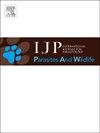对北方的征服仍在继续:来自德国的自由放养的入侵浣熊(Procyon lotor)携带了原yonis,包括东北部梅克伦堡-西波美拉尼亚州的首次报告
IF 2.2
3区 医学
Q3 ECOLOGY
International Journal for Parasitology-Parasites and Wildlife
Pub Date : 2025-09-17
DOI:10.1016/j.ijppaw.2025.101139
引用次数: 0
摘要
除东北部外,浣熊蛔虫(Baylisascaris procyonis)在德国广泛分布。这种人畜共患病的寄生虫可以在异源性和异常宿主(如人类)中引起神经系统疾病。顾名思义,浣熊是原芽胞杆菌的最终宿主。然而,尽管浣熊种群的成功扩张,寄生虫和宿主的范围并不总是重叠的。尽管在该国东北部地区有浣熊的稳定存在,但在该地区基本没有原梭状芽孢杆菌。在这项研究中,机会性地从德国9个联邦州的166只自由放养的浣熊身上收集了粪便和肠道样本。68只动物(41.0%)经PCR或形态鉴定鉴定为原yonis成虫。阳性浣熊来自6个联邦州,包括首次来自北部梅克伦堡-西波美拉尼亚州的动物。这项研究的结果强调了这种寄生虫在该国北部的传播,同时在德国其他地区保持存在。本文章由计算机程序翻译,如有差异,请以英文原文为准。

The conquest of the north continues: Baylisascaris procyonis in free-ranging invasive raccoons (Procyon lotor) from Germany, including a first report in the northeastern state of Mecklenburg-Western Pomerania
With exception of the Northeast, the raccoon roundworm (Baylisascaris procyonis) is widespread in Germany. This zoonotic parasite can cause neurological disease in paratenic and aberrant hosts, like humans. As the name indicates, raccoons are the definitive host of B. procyonis. However, and despite the successful expansion of the raccoon population, parasite and host ranges do not always overlap. B. procyonis has been largely absent from the northeastern part of the country, notwithstanding the stable presence of raccoons in this area. In this study, faecal and intestinal samples were opportunistically collected from 166 free-ranging raccoons from 9 federal states in Germany. In 68 animals (41.0 %), B. procyonis was identified either through PCR or morphological identification of adult worms. The positive raccoons originated from 6 federal states, including for the first time animals from the northern state of Mecklenburg-Western Pomerania. The results of this study highlight the dissemination of the parasite in the north of the country, while maintaining its presence in the rest of Germany.
求助全文
通过发布文献求助,成功后即可免费获取论文全文。
去求助
来源期刊

International Journal for Parasitology-Parasites and Wildlife
Medicine-Infectious Diseases
CiteScore
3.80
自引率
5.60%
发文量
113
审稿时长
45 days
期刊介绍:
The International Journal for Parasitology: Parasites and Wildlife (IJP-PAW) publishes the results of original research on parasites of all wildlife, invertebrate and vertebrate. This includes free-ranging, wild populations, as well as captive wildlife, semi-domesticated species (e.g. reindeer) and farmed populations of recently domesticated or wild-captured species (e.g. cultured fishes). Articles on all aspects of wildlife parasitology are welcomed including taxonomy, biodiversity and distribution, ecology and epidemiology, population biology and host-parasite relationships. The impact of parasites on the health and conservation of wildlife is seen as an important area covered by the journal especially the potential role of environmental factors, for example climate. Also important to the journal is ''one health'' and the nature of interactions between wildlife, people and domestic animals, including disease emergence and zoonoses.
 求助内容:
求助内容: 应助结果提醒方式:
应助结果提醒方式:


